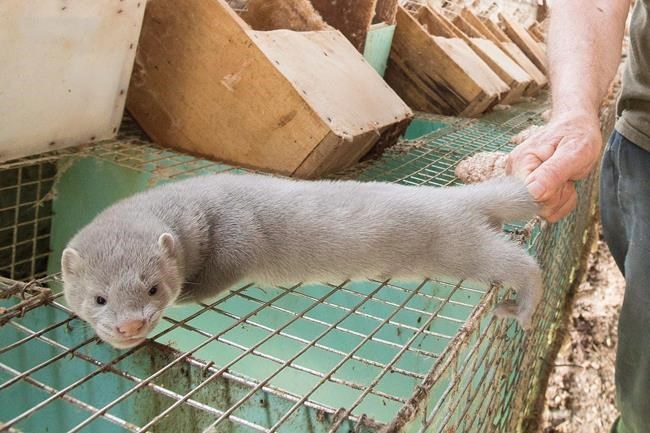
A rancher shows off a mink at a farm in St. Mary's, Ont., on July 9, 2015. THE CANADIAN PRESS/ Geoff Robins
Republished March 17, 2021 - 5:38 PM
Original Publication Date March 17, 2021 - 3:41 PM
VICTORIA - A mink farm that is still quarantined after a COVID-19 outbreak has begun its annual breeding program along with eight other farms in British Columbia.
The Agriculture Ministry said the province's chief veterinarian, Dr. Rayna Gunvaldsen, has approved the resumption of breeding while the farm remains under quarantine to reduce the risk of the virus spreading.
About 200 mink died late last year at the farm where COVID-19 was detected among employees, and Gunvaldsen has said the animals were likely infected after eight people became ill.
However, a second farm that remains quarantined is not currently breeding stock, the ministry said in a statement Wednesday about the Fraser Valley facility where a breeder decided to euthanize about 1,000 mink in January after three of the animals died.
Staff are in contact with all licensed mink farms to ensure precautions are in place to minimize any transmission of COVID-19 from humans to animals or from animals to humans, it said.
The B.C. chapter of the SPCA has called for a moratorium on mink farming, saying the animals are kept in tightly packed cages where infection spreads quickly and they shouldn't be killed for clothing.
A non-profit society called The Fur-Bearers has also said it's time to end the practice of using fur for apparel, especially because the industry is not a big economic driver for the country.
Alan Herscovici of the Canada Breeders Association said years of research has gone into the optimal raising of mink, and animal rights group that have opposed fur farming for years are now using COVID-19 to spread fear against a mostly family-run "artisanal" industry.
“That’s really irresponsible and not true and not fair,” he said from Ste-Agathe-des-Monts, Que.
“This is not a time to be attacking farmers. It’s a time to be supportive. Frankly, it’s offensive. And it’s all happening because of what happened in Denmark,” he said of the world's largest supplier of mink fur, where at least 15 million mink were culled last year to reduce the spread of COVID-19 from farm to farm.
Canada is known for producing some of the highest-quality mink fur in the world, as is the United States, Herscovici said.
“That’s only done with excellent care for the animals.”
Sixty mink farms across the country established strict precautions last year to restrict visitors, require employees to wear personal protective equipment and tell them not to come to work if they are feeling sick.
“They’ve apparently been very successful because we’ve only had these two farms in all of Canada where COVID was brought to the animals and the animals were infected,” Herscovici said.
Four mink farms also experienced outbreaks in separate U.S. states, and all of them followed similar procedures, he added.
The National Farm Animal Care Council develops codes of practice, the same for other livestock, he said, and provincial governments license and inspect the farms.
Most of Canada’s mink farms are in Ontario and Nova Scotia.
— By Camille Bains in Vancouver.
This report by The Canadian Press was first published March 17, 2021.
Note to readers: This is a corrected story. An earlier version said two quarantined farms are starting breeding programs, not one.
News from © The Canadian Press, 2021